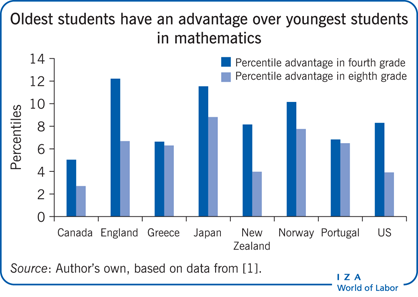Elevator pitch
Laws on age at school entry affect student achievement and often change for a number of reasons. Older students are more mature and ready to learn. This can have positive impacts on academic, employment, and earnings outcomes. The costs of holding children back include another year of childcare expenses or income forgone by the caregiver parent. Entering the workforce one year later also has implications for lifetime earnings and remittances to governments. School-entry policies could be a useful tool in increasing student achievement, but the short- and long-term impacts need to be better understood.
Key findings
Pros
The school-entry age has been decreasing around the world; however, in the US, the opposite has been occurring.
The trend in the US is partly due to changes in school-entry cut-off dates, but more parents—often of higher incomes—are also delaying their children’s school entry.
Increasing the school-entry age by changing the cut-off date can lead to increased future wages.
Being the oldest student within a group has strong short-term effects on outcomes, such as test scores, special-needs diagnosis, and leadership.
Cons
The optimal school-entry age is unknown and likely to depend on external factors, such as access to early childhood education.
More parents in the US are delaying their children’s school entry, despite mixed evidence of its benefits.
Findings on the effects of being older within a student group are inconclusive with respect to long-term outcomes, such as educational attainment, employment, and earnings.
It is uncertain whether the positive effects of being older within a group are due to the student’s age relative to their peers or the student’s absolute older (calendar) age.
